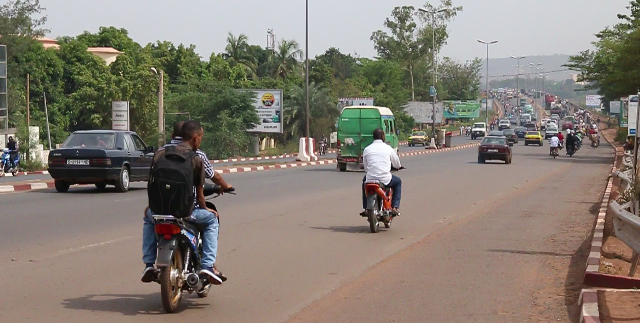In Bamako, getting to work in the morning and going home in the evening has become a depressing exercise. On the pocket handkerchief that we take us roads, one rolls tight and crammed. Lines of cars, which often reach three if there is no policeman. Motorcyclists who are constantly in a hurry, but, great disappointment, that we should not be surprised to find them sitting somewhere to drinking tea. And have no respect for anyone. Grouchy, careless, violent, proud: such could be the portrait of the driver in Mali, whether by car or motorbike. That is to say how our roads have swung into something irremediable, worrying, annoying and disappointing. Why the lines of cars are endless every evening and morning on the Fahd bridge? The lapidary and sufficient reply of the taximan: “Because we do not know how to drive”. This is not false, especially when one knows that under our latitudes a driving license is the easiest to acquire, everything passing through the piston, the bribe. Consequence: on our roads, human life is the least sacred. Traffic accidents become trivial, lives are brutally shortened, crumbled. This is what the everyday lives of users in Bamako and in the interior of the country are now summed up, while those in charge for responding seem to doze in the swamp of indifference, the abyss of contempt for the people.
In his lecture Toiles d’araignée Ibrahima Ly, who has been suspected of everything except hiding behind his little finger, has raised the problem in a worrying way: the people must be re-educated. This is the problem we will be facing in the years to come, and we will have to resolve it if we do not want to deal with another crisis that will further jeopardize our DNA. To re-educate the people is also to teach them to behave everywhere, but especially on our roads. For, let’s say it clearly, our roads have become the tomb of values that so far allow us not to lose face after losing everything. Everything, even our dignity of country having a glorious past which we like so well to avail. What is shown there every morning and every evening promises no good for the immediate future. Malians insult, kill Malians, kill each other, look at each other as a faience dog. On the road to Kalabancoro, which leads to the new University of Kabala, two students and a teacher died under the tires of dump trucks. Do the authorities have the nerve to tell us that they can do nothing about it?
Re-educate the people. In Algeria, in his speeches after independence, Ahmed Ben Bella said to his fellow citizens: «Do not spit on the ground! First, it’s dirty, and then it’s like spitting on your country». It is hard not to say that such exhortations are necessary today in Mali, 57 after independence, to win the battle of hygiene especially our roads that cover themselves each day of unacceptable dirt. Everything is thrown away: boss ladies, civil servants, and what else can I, lower the window of the vehicle to throw a bottle of candy, a bag of water? … For the short, the truth is that in this country there is has an urgent and pressing need for law and order. Because everything happens as if the government had no power, no authority. Meanwhile, our roads have become the mirror of our ugliness.
Sidi Ahmed S.
The views expressed in the article are those of the author and do not necessarily reflect those of Sahelien.com.

